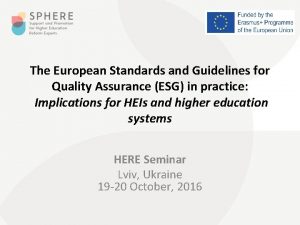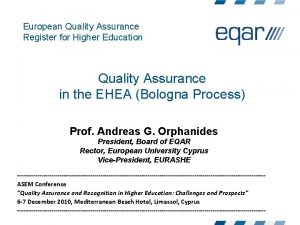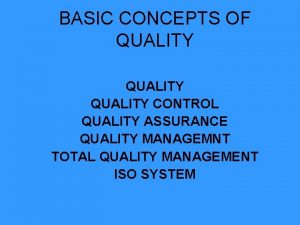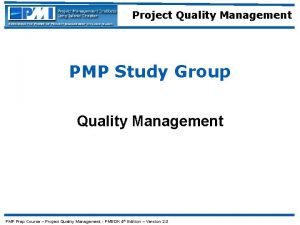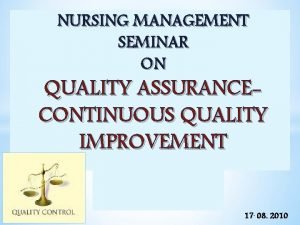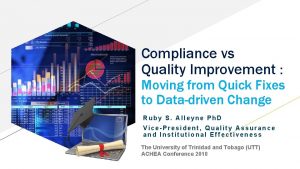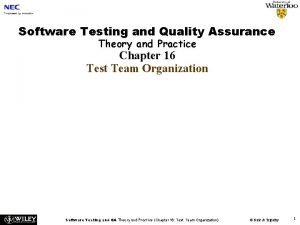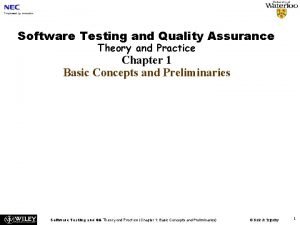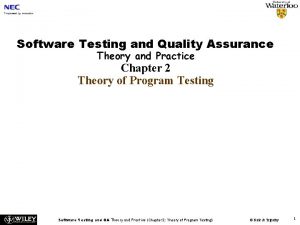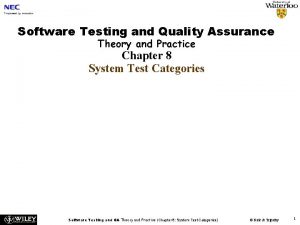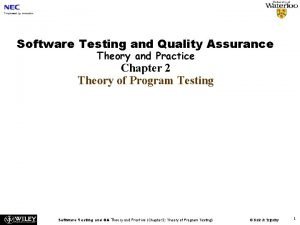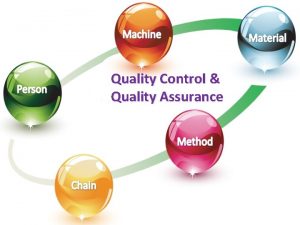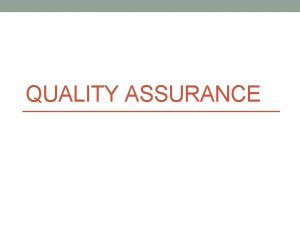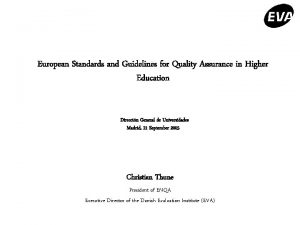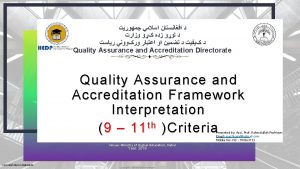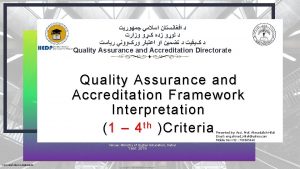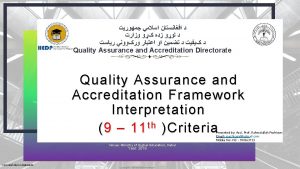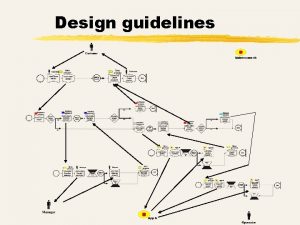European Standards and Guidelines for internal quality assurance
















- Slides: 16

European Standards and Guidelines – for internal quality assurance within higher education institutions Prof. György BAZSA, former president Hungarian Accreditation Committee (HAC) CUBRIK Workshop IV Beograd, 13 March, 2012

ESG - Part 1: European standards and guidelines for internal quality assurance within higher education institutions 1. 1 Policy and procedures for quality assurance 1. 2 Approval, monitoring and periodic review of programs and awards 1. 3 Assessment of students 1. 4 Quality assurance of teaching staff 1. 5 Learning resources and student support 1. 6 Information systems 1. 7 Public information

ESG 1. 1 Policy and procedures for quality assurance Standard: Institutions should have a policy and associated procedures for the assurance of the quality and standards of their programmes and awards. They should also commit themselves explicitly to the development of a culture which recognises the importance of quality, and quality assurance, in their work. To achieve this, institutions should develop and implement a strategy for the continuous enhancement of quality. The strategy, policy and procedures should have a formal status and be publicly available. They should also include a role for students and other stakeholders.

ESG 1. 1 Guidelines The policy statement is expected to include: • the relationship between teaching and research in the institution; • the institutions strategy for quality and standards; • the organisation of the quality assurance system; • the responsibilities of departments, schools, faculties and other organisational units and individuals for the assurance of quality; • the involvement of students in quality assurance; • the ways in which the policy is implemented, monitored and revised.

ESG 1. 2 Approval, monitoring and periodic review of programmes and awards Standard: Institutions should have formal mechanisms for the approval, periodic review and monitoring of their programmes and awards.

ESG 1. 2 Guidelines The quality assurance of programmes are expected to include: • development and publication of intended learning outcomes; • careful attention to curriculum and programme design and content; • specific needs of different modes of delivery (e. g. full time, parttime, distance-learning, e-learning) and types of higher education (e. g. academic, vocational, professional); • availability of appropriate learning resources; • formal programme approval procedures by a body other than that teaching the programme; • monitoring of the progress and achievements of students; • regular periodic reviews of programmes (including external panel members); • regular feedback from employers, labour market representatives and other relevant organisations; • participation of students in quality assurance activities.

ESG 1. 3 Assessment of students Standard: Students should be assessed using published criteria, regulations and procedures which are applied consistently.

ESG 1. 3 Guidelines Student assessment procedures are expected to: • be designed to measure the achievement of the intended learning outcomes and other programme objectives; • be appropriate for their purpose, whether diagnostic, formative or summative; • have clear and published criteria for marking; • be undertaken by people who understand the role of assessment in the progression of students towards the achievement of the knowledge and skills associated with their intended qualification; • where possible, not rely on a single examiners; • take account of all the possible consequences of examinations; • have clear regulations covering student absence, illness and other mitigating circumstances; • ensure that assessments are conducted securely in accordance with the institutions stated procedures;

ESG 1. 4 Quality assurance of teaching staff Standard: Institutions should have ways of satisfying themselves that staff involved with the teaching of students are qualified and competent to do so. They should be available to those undertaking external reviews, and commented upon in reports.

ESG 1. 4 Guidelines Teachers are the single most important learning resource available to most students. It is important that those who teach have a full knowledge and understanding of the subject they are teaching, have the necessary skills and experience to transmit their knowledge and understanding effectively to students in a range of teaching contexts, and can access feedback on their own performance. Institutions should ensure that their staff recruitment and appointment procedures include a means of making certain that all new staff have at least the minimum necessary level of compe-tence. Teaching staff should be given opportunities to develop and extend their teaching capacity and should be encouraged to value their skills. Institutions should provide poor teachers with opportunities to improve their skills to an acceptable level and should have the means to remove them from their teaching duties if they continue to be demonstrably ineffective.

ESG 1. 5 Learning resources and student support Standard: Institutions should ensure that the resources available for the support of student learning are adequate and appropriate for each programme offered.

ESG 1. 5. Guidelines In addition to their teachers, students rely on a range of resources to assist their learning. These vary from physical resources such as libraries or computing facilities to human support in the form of tutors, counsellors, and other advisers. Learning resources and other support mechanisms should be readily accessible to students, designed with their needs in mind and responsive to feedback from those who use the services provided. Institutions should routinely monitor, review and improve the effectiveness of the support services available to their students.

ESG 1. 6 Information systems Standard: Institutions should ensure that they collect, analyse and use relevant information for the effective management of their programmes of study and other activities.

ESG 1. 6 Guidelines The quality-related information systems required by individual institutions will depend to some extent on local circumstances, but it is at least expected to cover: • student progression and success rates; • employability of graduates; • students’ satisfaction with their programmes; • effectiveness of teachers; • profile of the student population; • learning resources available and their costs; • the institution’s own key performance indicators.

ESG 1. 7 Public information Standard: Institutions should regularly publish up to date, impartial and objective information, both quantitative and qualitative, about the programmes and awards they are offering.

ESG 1. 7 Guidelines: In fulfilment of their public role, higher education institutions have a responsibility to provide information about the programmes they are offering, the intended learning outcomes of these, the qualifications they award, the teaching, learning and assessment procedures used, and the learning opportunities available to their students. Published information might also include the views and employment destinations of past students and the profile of the current student population. This information should be accurate, impartial, objective and readily accessible and should not be used simply as a marketing opportunity. The institution should verify that it meets its own expectations in respect of impartiality and objectivity.
 European standards and guidelines for quality assurance
European standards and guidelines for quality assurance European quality assurance standards
European quality assurance standards European quality assurance
European quality assurance Quality assurance vs quality control
Quality assurance vs quality control Quality assurance concepts
Quality assurance concepts Software quality assurance iso standards
Software quality assurance iso standards Pmp quality vs grade
Pmp quality vs grade Pmp gold plating
Pmp gold plating Total quality management seminar
Total quality management seminar Quality improvement vs quality assurance
Quality improvement vs quality assurance Software testing and quality assurance: theory and practice
Software testing and quality assurance: theory and practice Quality revolution
Quality revolution Theory of goodenough and gerhart
Theory of goodenough and gerhart Software testing and quality assurance theory and practice
Software testing and quality assurance theory and practice Quality assurance theory
Quality assurance theory Sqa tools and techniques
Sqa tools and techniques Compartmentalization interdependency effort validation r
Compartmentalization interdependency effort validation r
